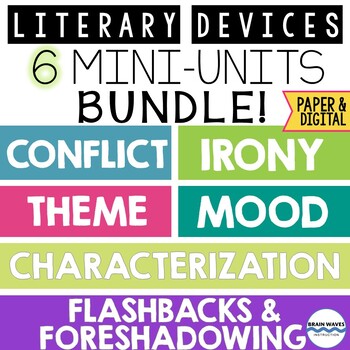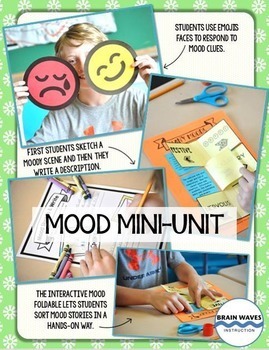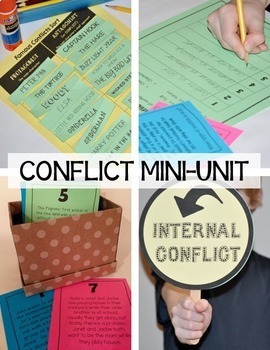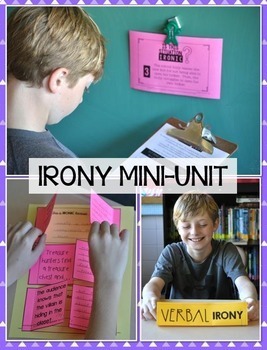Literary Devices Bundle: 6 Fun Literary Elements Mini-Units (Paper and Digital)
- Zip
- Google Apps™

What educators are saying
Products in this Bundle (6)
showing 1-5 of 6 products
Description
Save BIG with this bundle of LITERARY DEVICES mini-units --- Theme, Conflict, Characterization, Irony, Mood, Flashbacks and Foreshadowing!
This bundle includes SIX 3-day mini-units!
Great News! The student packet in each mini-unit is also available as a Google Slides resource for students. In addition to the PDF version, students can complete the packet pages via a file sharing service such as Google Drive, Google Classroom, or in the internet “cloud.” The digital version of the packet is accessible from any computer and allows students to complete their work online.
* FYI: The anticipatory set activities that accompany each lesson are NOT in a digital format. They will still need to be printed for students due to the hands-on and interactive nature of the activities.
--------------------------------------------------------------------------------------------------------------
Theme Mini-Unit
The theme mini-unit provides numerous opportunities to develop the skill of identifying theme. Each lesson starts with a fun and engaging activity – Theme Comics, Theme Cut-and-Paste Matching, Theme Poetry Walk. Then, students learn about and practice identifying theme through whole group instruction, small group work, partnerships, and independent practice. In this mini-unit, students will develop a deep understanding of literary devices, theme, explicit and implied theme, and how to identify theme in a passage. Students will complete guided notes, reading comprehension passages, graphic organizers and theme analysis with mini-passages. In addition, they’ll practice identifying theme by reading and acting in a play and while reading short and long reading passages.
The detailed THEME mini-unit includes:
• 3 Detailed Daily Lesson Plans
• Theme Comic Topics
• Theme Comic Strip Template
• Theme Matching Mini-Passages (6)
• Theme Matching Cards
• 5 Poem Posters
• Theme in Poetry Graphic Organizer
• Play Parts for Character Tags (6)
• Theme and Literary Devices Guided Notes
• 3 Short Passages with Reading Comprehension Questions
• What is Theme? Graphic Organizer
• “The Four Oxen and a Lion” Play
• Identify the Theme Practice
• Long Reading Passage with Questions
• All keys for student work and instruction
--------------------------------------------------------------------------------------------------------------
Conflict Mini-Unit
The conflict mini-unit provides numerous opportunities to develop the skill of identifying conflict. Each lesson starts with a fun and engaging activity – Famous Conflict Sort, Internal and External Conflict Judging (with paddles), and Conflict Task Cards. Then, students learn about and practice identifying conflict through whole group instruction, small group work, partnerships, and independent practice.
In this mini-unit, students will develop a deep understanding of literary devices, conflict, internal and external conflict, as well as the four major types of conflict in literature (character vs. self, character vs. character, character vs. nature, and character vs. society). Students will complete guided notes, reading comprehension passages, graphic organizers and conflict sketches. In addition, they’ll practice identifying conflict with conflict statements and while reading short and long reading passages (5).
The detailed CONFLICT mini-unit includes:
• 3 Detailed Daily Lesson Plans
• Famous Conflict Sort Activity with Protagonists and Antagonists
• Internal and External Conflict Paddle Cards
• Passages for Conflict Judging (8)
• Conflict Task Cards (8) and Record Sheet
• Guided Notes on Literary Devices, Conflict, and Types of Conflict
• 3 Short Practice Passages with Short Answer Questions
• Types of Conflict Graphic Organizer
• Types of Conflict Practice
• Conflict Definitions and Sketch Graphic Organizer
• Identifying Conflict Guided Notes
• Conflict Statement Practice
• 2 Long Practice Passages with Multiple Choice and Short Answer Questions
• All keys for student work and instruction
--------------------------------------------------------------------------------------------------------------
Characterization Mini-Unit
The characterization mini-unit provides numerous opportunities to develop the skill of understanding characters. Each lesson starts with a fun and engaging activity – Character Sketch, Character Snapshots, and a Character Improvisation game. Then, students learn about characterization through whole group instruction, small group work, partnerships, and independent practice.
In this mini-unit, students will develop a deep understanding of literary devices, characterization, methods of characterization (5), types of characterization (direct and indirect), and how to identify characterization in a passage. Students will complete guided notes, reading comprehension passages, graphic organizers and character analysis with mini-passages.
The detailed CHARACTERIZATION mini-unit includes:
• 3 Detailed Daily Lesson Plans
• Character Sketch Brainstorm
• Character Sketch Writing Activity
• Character Snapshots
• Character Descriptions
• Need a Ride? Improvisational Game Directions
• Need a Ride? Character Traits
• Characterization and Literary Devices Guided Notes
• 3 Short Passages with Reading Comprehension Questions
• Types of Characterization Guided Notes
• 8 Direct and Indirect Characterization Task Cards
• 2 Long Reading Passages with Questions
• All keys for student work and instruction
--------------------------------------------------------------------------------------------------------------
Irony Mini-Unit
The IRONY MINI-UNIT provides numerous opportunities for students to learn about the three types of irony, determine the purpose of irony, analyze irony, describe how irony contributes to a story and even write their own examples of irony. Each lesson starts with a fun and engaging activity – Irony Hunt (where students differentiate between examples of irony and just bad luck while rotating around the classroom), Types of Irony – Tri-Fold Cards (where students create flippable cards for the types of irony that they flip in response to ironic situations), and Irony Flip Cards (where students create interactive flip shapes, create irony, and then explain it). Then, students learn about and practice understanding irony through whole group instruction, small group work, partnerships, and independent practice.
The detailed IRONY mini-unit includes:
• 3 Detailed Daily Lesson Plans
• Irony Hunt Tracking Sheet
• 10 Irony Hunt Task Cards
• Irony Clues (for teacher read aloud)
• Types of Irony Tri-Fold Cards
• Irony Flip Cards (with sentence starters)
• Irony Flip Cards (with blanks)
• Irony Explanation Templates
• Literary Devices and Irony Guided Notes
• Three Practice Reading Passages with Comprehension Questions
• Finish the Story – Writing Activity
• Types of Irony Guided Notes
• Make it Ironic Activity
• Irony Types Partner Activity
• Breaking News – Irony Headlines and Analysis
• Long Reading Passage and Reading Comprehension Questions
• All keys for student work and instruction
--------------------------------------------------------------------------------------------------------------
Flashback and Foreshadowing Mini-Unit
The Foreshadowing and Flashbacks Mini-Unit provides numerous opportunities to help students understand and analyze both literary devices. Each lesson starts with a fun and engaging activity – Nursery Rhymes Foreshadowing Foldable, Personal Flashbacks, and Foreshadowing vs. Flashback Sort. Then, students learn about and practice identifying the literary elements through whole group instruction, small group work, partnerships, and independent practice.
The detailed FORESHADOWING AND FLASHBACKS mini-unit includes:
• 3 Detailed Daily Lesson Plans
• Foreshadowing Shapes and Statements for Nursery Rhymes
• Altered Nursery Rhymes Activity
• Personal Flashbacks Activity
• Flashbacks vs. Foreshadowing Chart
• Flashbacks vs. Foreshadowing Sorting Activity
• Guided Notes on Foreshadowing
• 3 Short Reading Passages and Questions for Foreshadowing
• What Happens Next – Prediction Activity
• Guided Notes on Flashbacks
• 3 Reading Passages and Questions for Flashbacks
• Find the Flashback Activity
• Guided Notes on Chronological Order
• Long Reading Passage with both Foreshadowing and Flashbacks
• Reading Comprehension Questions
• Writing & Foreshadowing Activity
• Writing a Flashback Activity
• All keys for student work and instruction
--------------------------------------------------------------------------------------------------------------
Mood Mini-Unit
The 3-day MOOD mini-unit provides lots of opportunities for students to read, write, and discuss mood. Each lesson starts with a fun and engaging activity – Emoji Moods (where students hold up emoji faces in response to teacher clues) – Many Moods Foldable (where students sort jumbled moods into an interactive shape) – Mood Sketch and Write (where students sketch 4 moody scenes and then describe them). Then, students learn about and practice identifying the mood in literature through whole group instruction, small group work, partnerships, and independent practice.
The detailed MOOD mini-unit includes:
• 3 Detailed Daily Lesson Plans
• Emoji Moods – Happy and Depressed Hands-On Shapes
• Emoji Moods – Clue Sentences
• Many Moods Foldable – Story Cards
• Many Moods Foldable – Interactive Shape
• 4 Mood Sketch and Write Activities
• Guided Notes on Literary Devices and Mood
• 3 Short Reading Passages and Questions for Mood
• What a Mood – Writing Activity
• Guided Notes on Mood and Word Choice
• Poetry and Mood Analysis – with 3 Analysis Tasks
• Guided Notes on Mood and Setting
• Long Reading Passage
• All keys for student work and instruction
You may also like...
Incredible Journeys Multi-Unit Bundle: Literature Study, Historical Text Analysis, Poetry Analysis, Poetry Writing, Speech Analysis, Mini-Research Project, Speech Writing and Presentation, & Personal Journey Reflection
Following is Fun!
Get the inside scoop on all store discounts, free products, and product launches. Just click the green “Follow Me” star under my store name on this page or click the green “Follow Me” star on my store homepage.
*** Click HERE to receive the Brain Waves Instruction Newsletter filled with exclusive FREEBIES and Teaching Tips!
*** Click HERE to become a seller on TpT (Referral by Brain Waves Instruction)
Thanks!
Brain Waves Instruction





